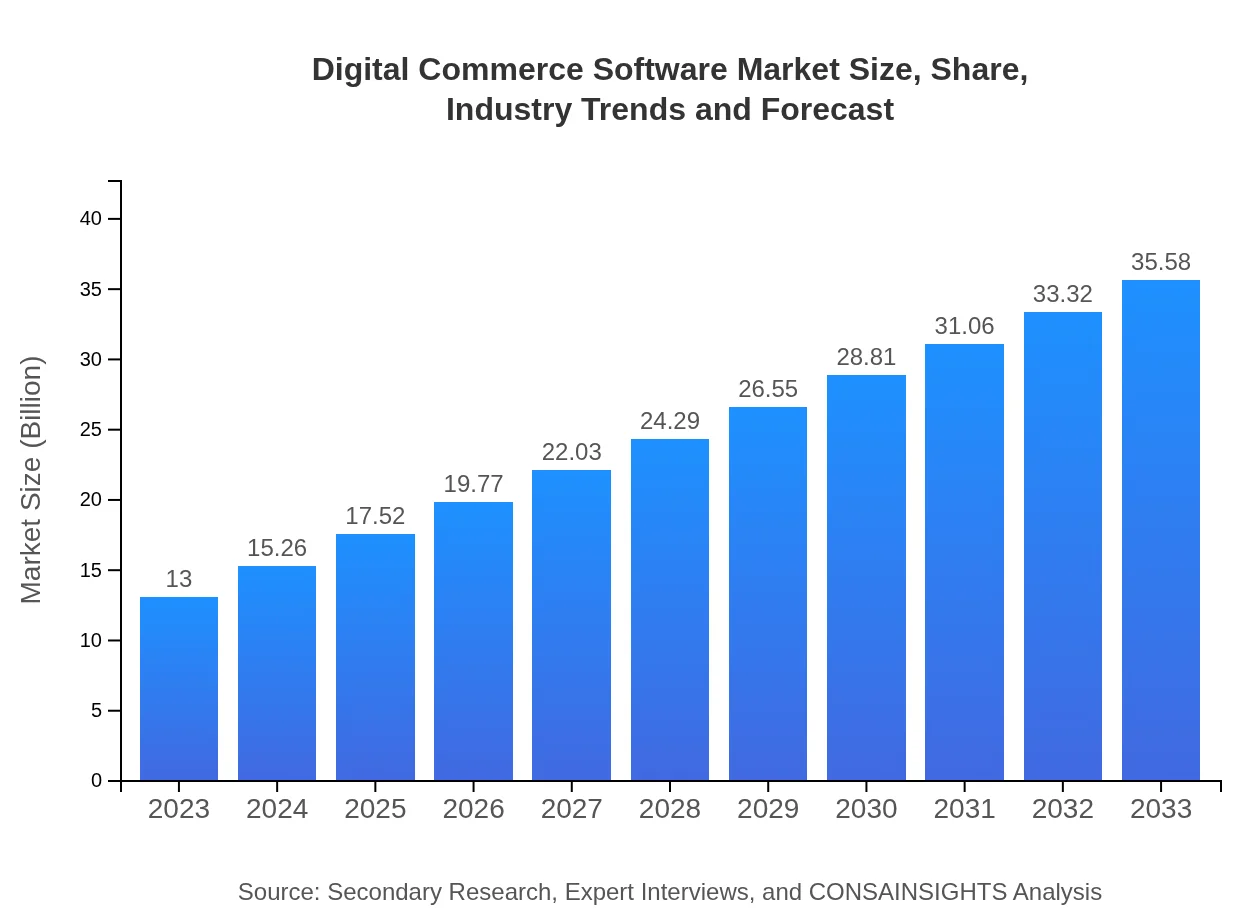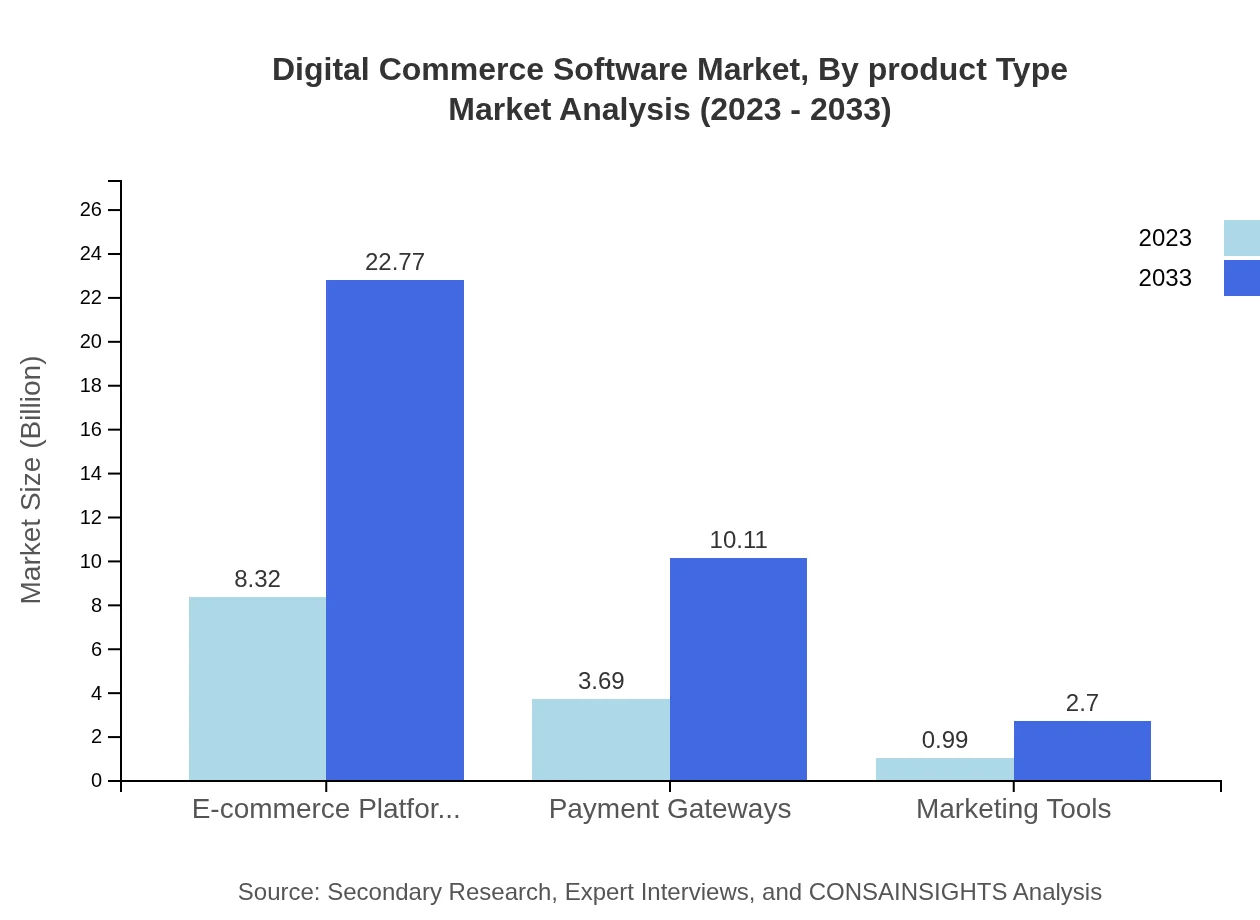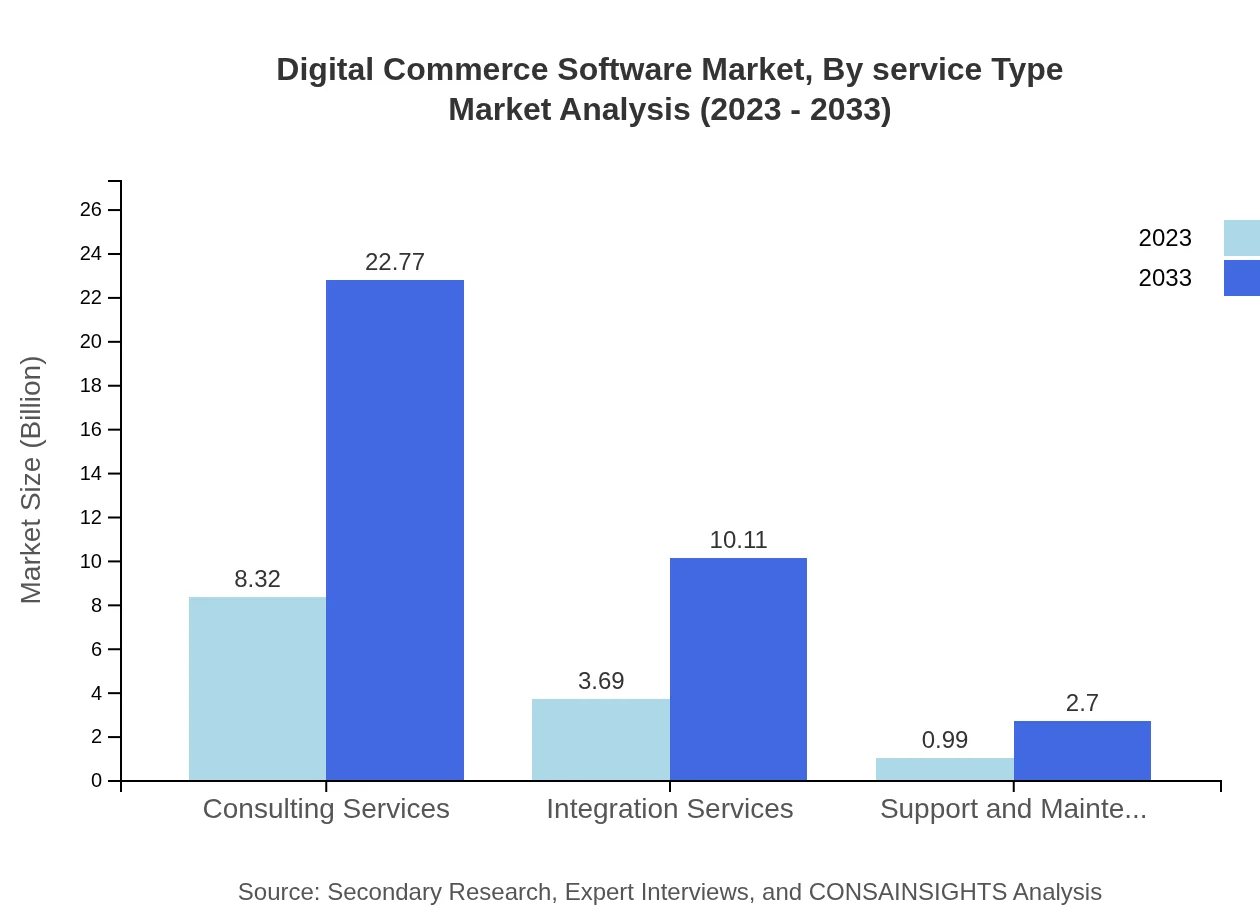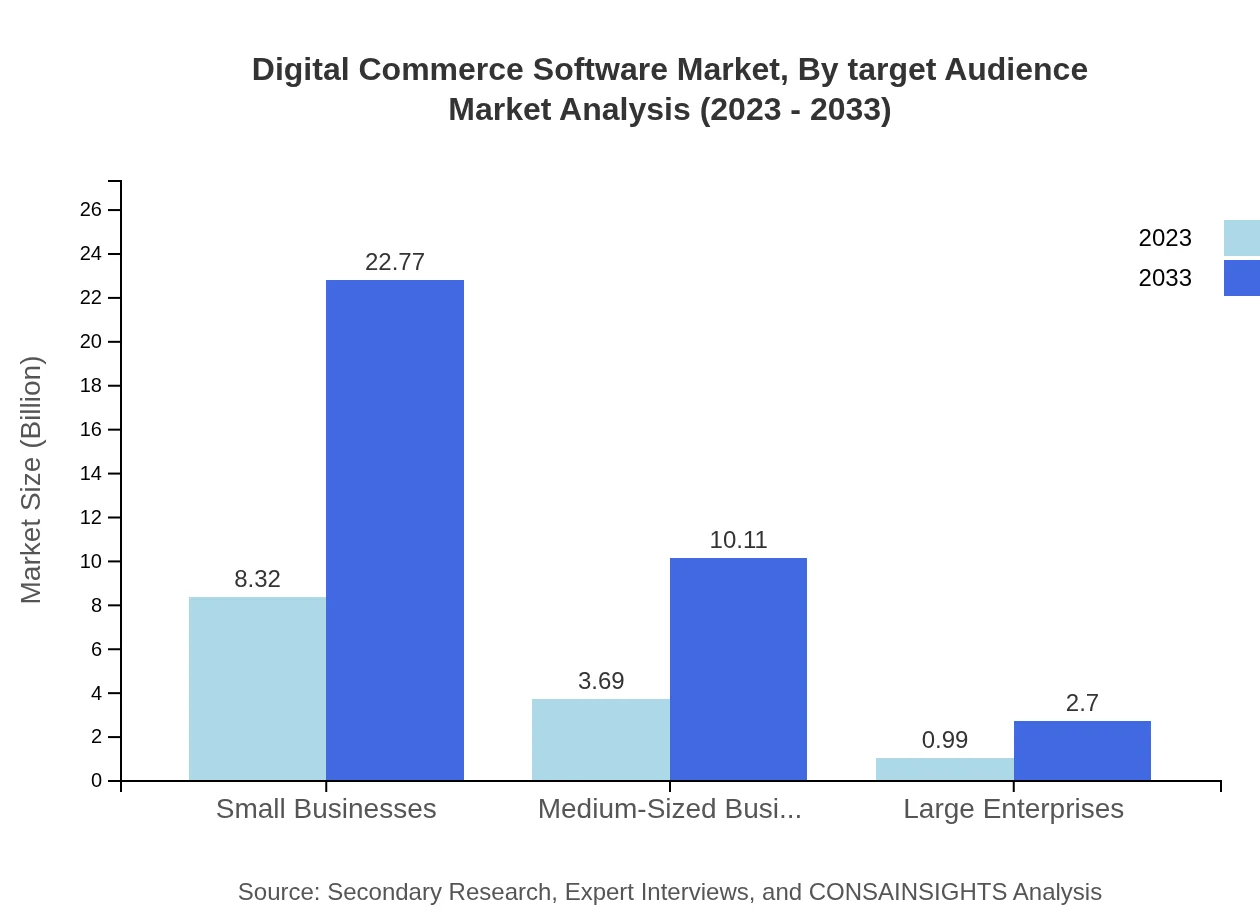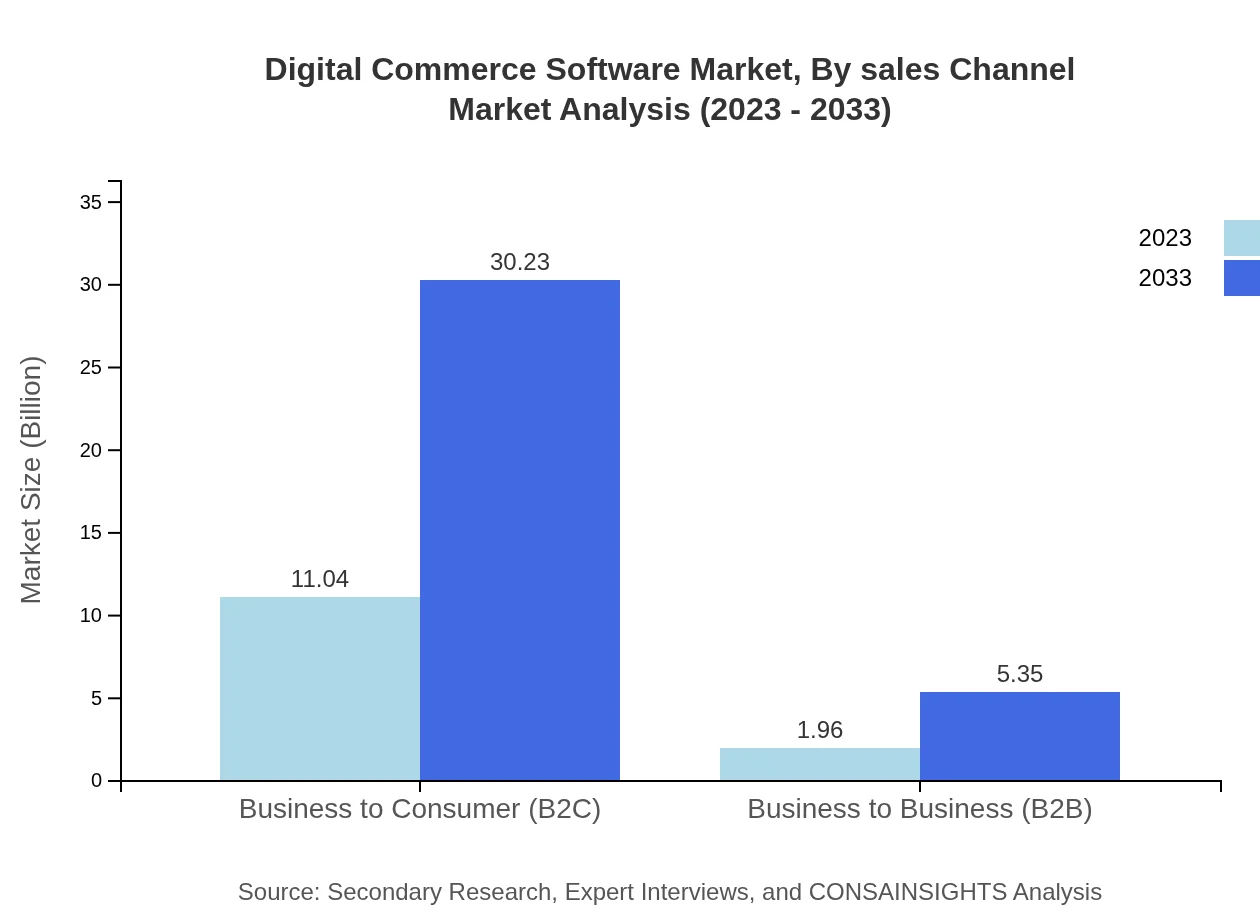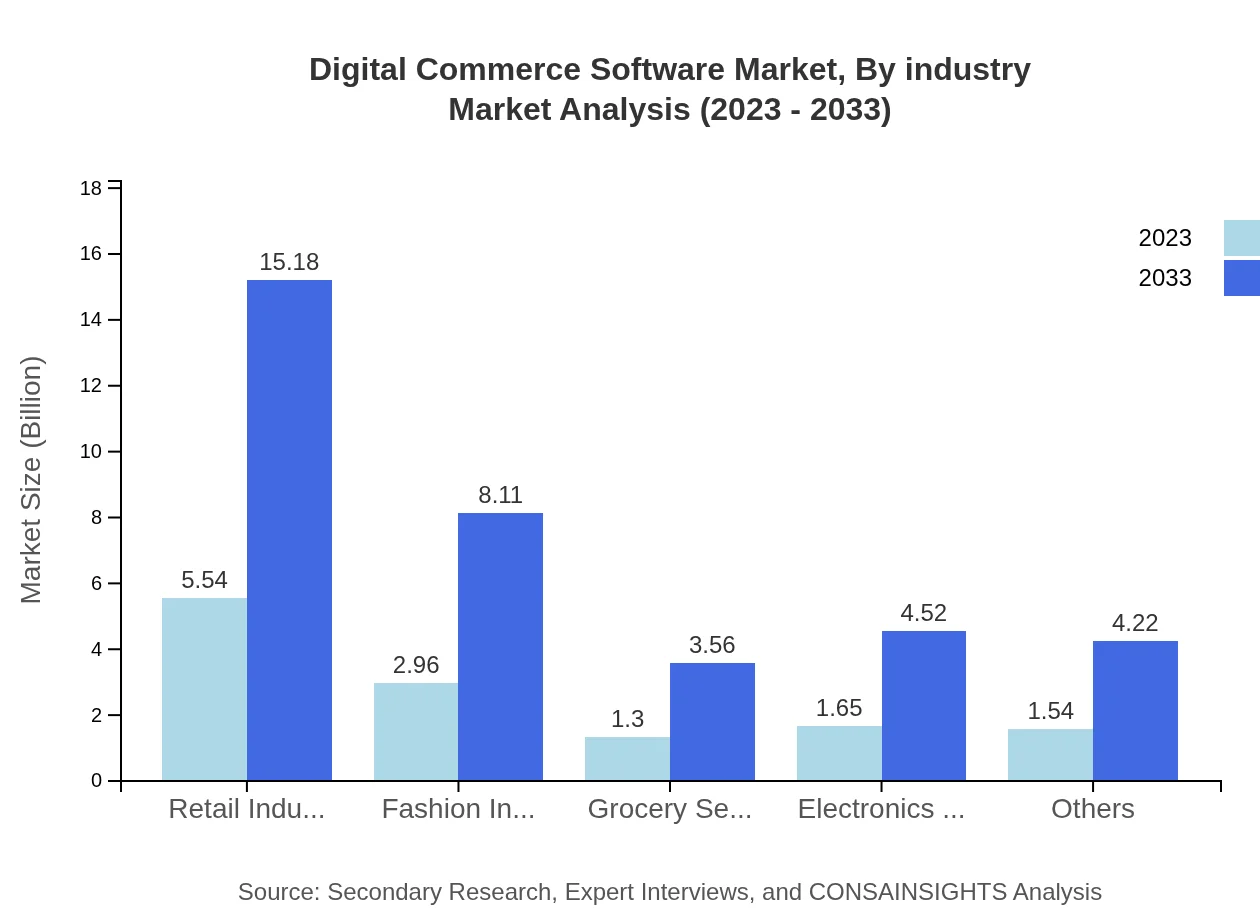Digital Commerce Software Market Report
Published Date: 31 January 2026 | Report Code: digital-commerce-software
Digital Commerce Software Market Size, Share, Industry Trends and Forecast to 2033
This report provides a comprehensive analysis of the Digital Commerce Software market from 2023 to 2033, highlighting trends, opportunities, and challenges. It includes insights on market size, regional analysis, key players, and future forecasts.
| Metric | Value |
|---|---|
| Study Period | 2023 - 2033 |
| 2023 Market Size | $13.00 Billion |
| CAGR (2023-2033) | 10.2% |
| 2033 Market Size | $35.58 Billion |
| Top Companies | Shopify, Magento, Salesforce, BigCommerce |
| Last Modified Date | 31 January 2026 |
Digital Commerce Software Market Overview
Customize Digital Commerce Software Market Report market research report
- ✔ Get in-depth analysis of Digital Commerce Software market size, growth, and forecasts.
- ✔ Understand Digital Commerce Software's regional dynamics and industry-specific trends.
- ✔ Identify potential applications, end-user demand, and growth segments in Digital Commerce Software
What is the Market Size & CAGR of Digital Commerce Software market in 2023?
Digital Commerce Software Industry Analysis
Digital Commerce Software Market Segmentation and Scope
Tell us your focus area and get a customized research report.
Digital Commerce Software Market Analysis Report by Region
Europe Digital Commerce Software Market Report:
In Europe, the Digital Commerce Software market is estimated to grow from $3.45 billion in 2023 to $9.45 billion by 2033. Increasing regulatory changes around data protection and security are also steering businesses to invest in comprehensive software solutions.Asia Pacific Digital Commerce Software Market Report:
The Asia Pacific region is poised for significant growth in the Digital Commerce Software market, with expectations that its market size will rise from $2.72 billion in 2023 to $7.45 billion by 2033. Factors driving this growth include increased internet penetration, smartphone adoption, and a burgeoning middle class with rising disposable incomes.North America Digital Commerce Software Market Report:
North America remains a dominant player in the Digital Commerce Software market, expected to increase from $4.20 billion in 2023 to $11.50 billion by 2033. The region benefits from established technological infrastructures and a high level of consumer adoption of online shopping.South America Digital Commerce Software Market Report:
The South American market for Digital Commerce Software is anticipated to grow from $1.14 billion in 2023 to $3.11 billion by 2033. This growth is backed by an expanding digital infrastructure and a growing recognition of the importance of e-commerce amongst businesses.Middle East & Africa Digital Commerce Software Market Report:
The Middle East and Africa are seeing a burgeoning market, with projections indicating a rise from $1.48 billion in 2023 to $4.06 billion by 2033. The region is focusing on digital transformation, which is instrumental for the growth of digital commerce.Tell us your focus area and get a customized research report.
Digital Commerce Software Market Analysis By Product Type
The analysis of the Digital Commerce Software market by product type reveals significant contributions from e-commerce platforms, which alone are expected to grow from $8.32 billion in 2023 to $22.77 billion by 2033, capturing 63.99% of the market share. Payment gateways follow next, growing from $3.69 billion to $10.11 billion, with a market share of 28.42%. Other product types like marketing tools are projected to increase as businesses seek to enhance their online engagement.
Digital Commerce Software Market Analysis By Service Type
By service type, consulting services dominate the landscape, showing a rise from $8.32 billion in 2023 to $22.77 billion by 2033, maintaining a 63.99% market share. Integration services and support and maintenance services are also essential, with their respective markets expected to reach $10.11 billion and $2.70 billion, indicating growing demand for holistic software solutions.
Digital Commerce Software Market Analysis By Target Audience
Target audience segmentation reveals that the Business to Consumer (B2C) segment leads the market, projected to grow from $11.04 billion in 2023 to $30.23 billion by 2033, capturing 84.96% of the market. Conversely, the Business to Business (B2B) market is smaller yet crucial, expected to expand from $1.96 billion to $5.35 billion.
Digital Commerce Software Market Analysis By Sales Channel
Sales channel analysis demonstrates a strong inclination towards online marketplaces, where businesses are rapidly transitioning to sell via digital platforms. These channels are forecasted to grow substantially, supported by enhanced digital marketing strategies and the increasing prevalence of social commerce.
Digital Commerce Software Market Analysis By Industry
The retail industry holds a significant share of the Digital Commerce Software market, projected to grow from $5.54 billion in 2023 to $15.18 billion by 2033. Adjacent sectors like fashion and electronics also contribute significantly, focused on enhancing customer experience through technology.
Digital Commerce Software Market Trends and Future Forecast
Tell us your focus area and get a customized research report.
Global Market Leaders and Top Companies in Digital Commerce Software Industry
Shopify:
Shopify is a leading e-commerce platform that enables businesses to set up their online stores with ease, offering solutions designed for various business sizes.Magento:
Magento provides a robust e-commerce platform known for its customization capabilities, catering to businesses that require scalable and sophisticated solutions.Salesforce:
Salesforce leads in CRM and customer engagement software, featuring tools that integrate with various e-commerce solutions for enhanced customer experiences.BigCommerce:
BigCommerce offers a cloud-based e-commerce platform designed to grow businesses with advanced features for performance and user experience.We're grateful to work with incredible clients.









FAQs
What is the market size of digital Commerce Software?
The digital commerce software market is valued at $13 billion in 2023 and is projected to grow at a CAGR of 10.2% through 2033, indicating robust expansion and increasing adoption across various sectors.
What are the key market players or companies in this digital Commerce Software industry?
Key players in the digital commerce software industry include leading technology companies that specialize in e-commerce solutions, platform providers, and payment processing companies known for innovating digital transaction tools and customer service strategies.
What are the primary factors driving the growth in the digital commerce software industry?
The growth in digital commerce software is driven by increasing internet penetration, the rise in online shopping, advancements in payment technologies, and the need for businesses to integrate comprehensive e-commerce solutions to meet customer demands.
Which region is the fastest Growing in the digital commerce software market?
North America is the fastest-growing region in the digital commerce software market, expanding from $4.20 billion in 2023 to $11.50 billion by 2033, led by the high adoption rates of e-commerce platforms.
Does ConsaInsights provide customized market report data for the digital commerce software industry?
Yes, ConsaInsights offers customized market report data tailored to the digital commerce software industry, catering to specific client needs and focusing on unique market segments, trends, and insights.
What deliverables can I expect from this digital Commerce Software market research project?
Deliverables from the digital commerce software market research include comprehensive reports, market forecasts, segment analysis, competitive landscape evaluations, and actionable insights designed to guide strategic decision-making.
What are the market trends of digital Commerce Software?
Market trends in digital commerce software include an increase in mobile commerce, the development of omnichannel strategies, enhanced personalization techniques, and growing popularity of subscription services within the e-commerce landscape.

